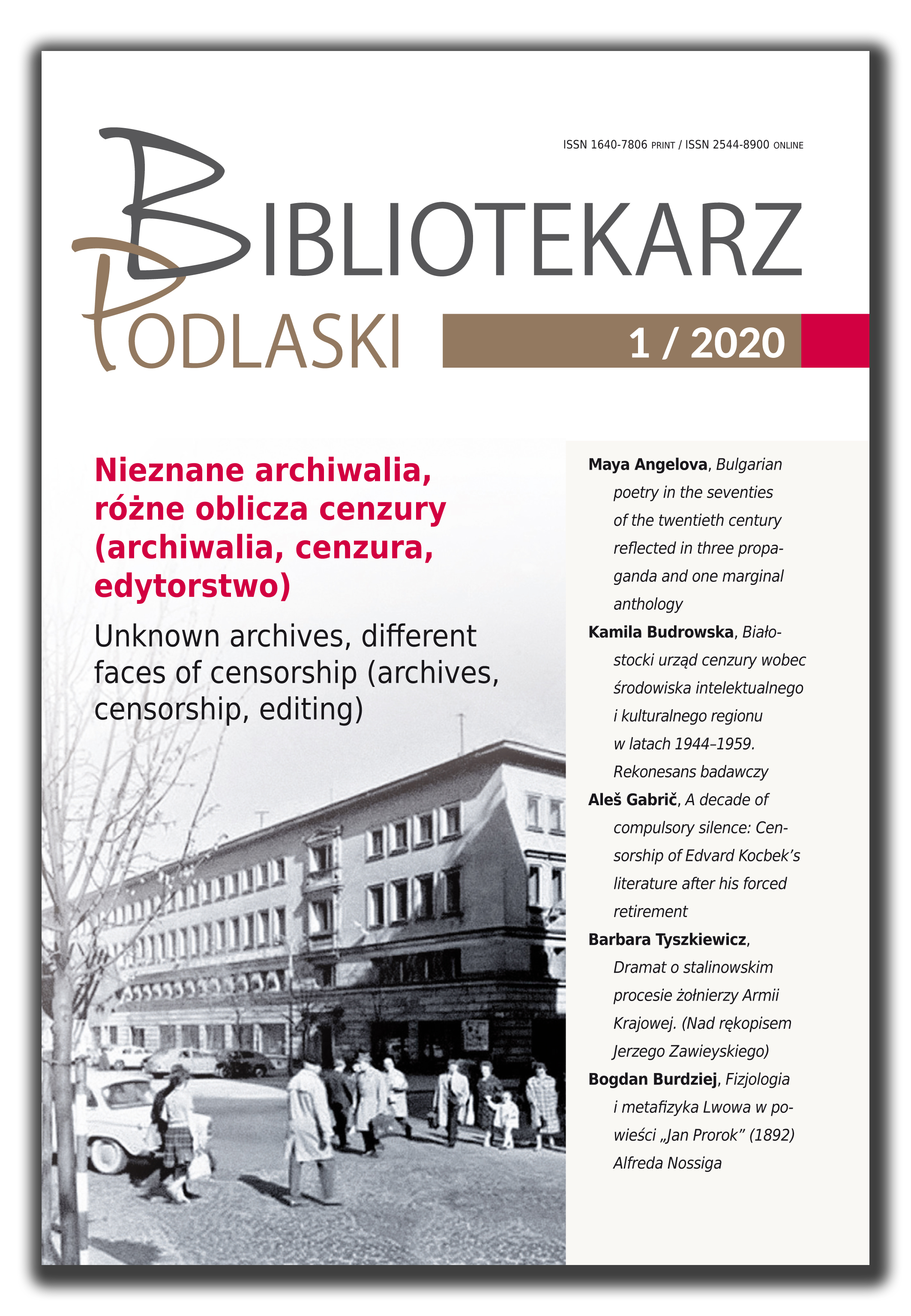Abstract
This article investigates the scope of ideology that infected poetry in the nineteen seventies; the processes of marginalization of uncomfortable poetic voices, and respectively, the mechanisms imposing propaganda and anthologizing the poetically wrapped agitation; the stabilizations and tensions along the centre-periphery axis; the role of anthologies by authors not from the capital in the process of making sense of the country (province) as one free from the political poetic category. In a synchronous plan, some anthological specimens were issued over a short period of time, e.g. Poetic Anthology about the Silent Feat (1974), The High Wave (1974), Sprays (1975) and Poppies (1977).
The first anthology is dedicated to the law enforcement agencies and to the state security. The second is an oriented and ambitious paragon of socialist realism poetry. The third anthology has been conceived of as a forum for the authors who were selected exclusively from among the members of the Union of Bulgarian writers. The fourth volume is a seemingly unpretentious collection that defines itself as an anthology. The compilation process, however, took pains far greater than expected – it was a three-year long odyssey from the moment the anthology of national/home poetry was included in the publishing plan for 1975 to the admission of an unnamed title in the publishing plan for 1977, as well as the resulting marginalization of the Poppies anthology after its publication.
References
Doinov P., Cenzura w podstpitie na narodnata riepublika (1944/1945), [w:] Cenzurata wrchu błgarskata litieratura i kniga 1944–1990, red. P. Doynov, Sofia 2018, s. 13–29, Queen Mab.
Doinov P., Zaszczo “tichata lirika“ nie je “tichaja lirika“, “Literary Gazette” 13-19.05.2015, nr 18.
Evtimov E., Zidarov I., Pojeticzna antołogija za młczaliwija podwig: Stichowie i pojemi, Sofia 1974, National Youth.
Germanov A., Yordanov T., Makowie: Antołogija, Varna 1977, G. Bakalof.
Konstantinova E., Cholakov Z., Danchev P., Wisokata włna: Błgarska riewolucyonna lirika, Sofia 1974, Partizdat, s. 9.
Krasteva G., Idie li smiana? (Błgarskata lirika ot 70-tie godini na XX wiek – diskusii w pieriodicznija pieczat, litieraturnokriticzeski ocenki i litieraturnoistoriczesko konstruiranie na pieriodi, stiłowie, awtori, tiemi), “LiterNet”, no 10 (20.10.2011): https://liternet.bg/publish20/g_krysteva/ide-li-smiana.htm [20.07.2020].
Krasteva G., “Pojeticzesko izkustwo” ili raznolikijat kanon (Nabludienija wrchu błgarskata pojezija ot 60-tie i 70-tie godini na CHCH wiek w kontieksta naproblema za liriczeskata samonabludatiełnost), [w:] Prostranstwata na Słowoto. Jubilejen sbornik w czest na prof. d. f. n. Swietłozar Igow, t. I, red. K. Protohristova, Sofia 2012, s. 629–645.
Molkhov Y., Strkowie: Antołogija, Varna 1975, G. Bakalov.
Ogoyska M., Komitiett po pieczata: riegłamientiranata “cenzura” na 70-tie i masowata kułtura, [w:] Cenzurata wrchubłgarskata litieratura i kniga 1944–1990, red. P. Doynov, Sofia 2018, s. 55–76, Queen Mab.
Paperny V., Architecture in the Age of Stalin: Culture Two, przeł. John Hill i Roann Barris (Cambridge Studies in New Art History and Criticism) New York: Cambridge University Press. 2002.
Ryklin M., Mietrodiskurs, “Topos. Literary and Philosophical Journal” (13.07.2005): http://www.topos.ru/article/3805 [20.07.2020].
Stankov I., Pojett i tiszynata, “Literary Gazette” 13-19.05.2015, nr 18.
Todorov Tsv., Aksiołogija na razuma, Sofia 2011, East-West.
Yordanov A., Zajedna antołogija i nie samo za nieja, „September”, 1978, nr 5, s. 47.
Yordanov T., Makowie, „Literary World”, No 27, (March 2011): 8, https://literaturensviat.com/?p=36014 [20.07.2020].
Yordanov T., Pojeticzno ziemieopisanije na Błgarija, [w:] Makowie, Varna 1977, Georgi Bakalov.
Articles published in the “gold open access” mode on the basis of a non-exclusive license agreement between the publisher and the author. Permitted use:
- the publication may be read and stored on any device,
- the publication may be cited (with obligatory reference to the author, the title of the text, as well as the full title, bibliographic address of the issue and page of the journal)
The editorial team of “Bibliotekarz Podlaski” implements an open access policy by publishing materials in the form of the so-called Gold Open Access. From volume 42 (issue 1/2019), the journal is available under the Creative Commons license (Attribution – ShareAlike: CC BY-SA).
The key declarations of the Open Access and Open Science movement, which we fully support, are available on the CEON Open Science website.
COPYRIGHT:
The editorial team of “Bibliotekarz Podlaski” implements an open access policy by publishing materials in the form of the so-called Gold Open Access. The journal is available under the Creative Commons license – Attribution – ShareAlike 4.0: International: CC BY-SA 4.0).
The key declarations of the Open Access and Open Science movement, which we fully support, are available on the CEON Open Science website.
“Bibliotekarz Podlaski” allows its readers to read, download, copy, distribute, print, search and link to the full content of articles. We enable full, immediate, unlimited (both in a territorial, temporal and technical sense) open access to all published content, in accordance with the principle that freely available research increases and accelerates the global development of science and the exchange of knowledge.
The editorial team of “Bibliotekarz Podlaski” encourages authors to place articles published in the journal in open repositories (after the review or the final version of the publisher), provided that a link to the journal’s website is provided.
The journal does not charge the authors any fees for accepting and publishing their texts.


